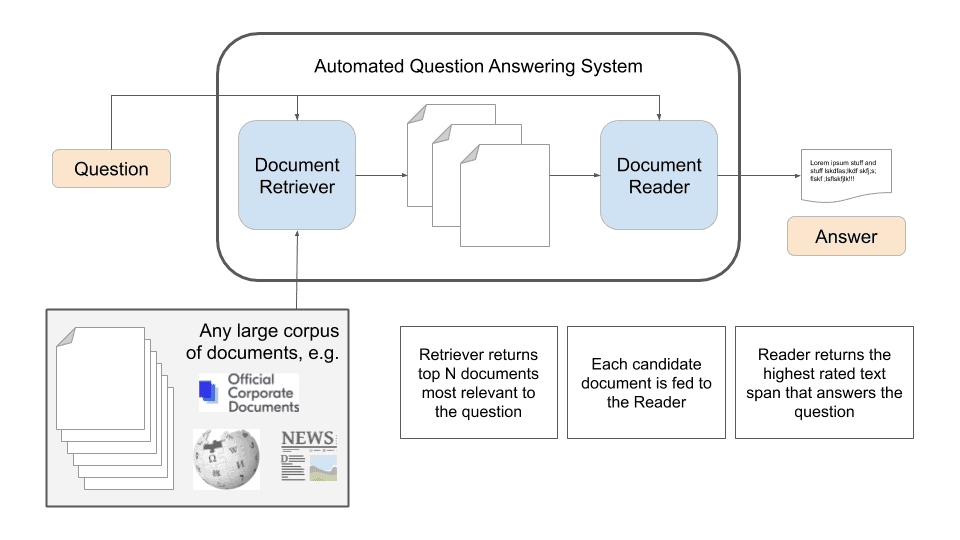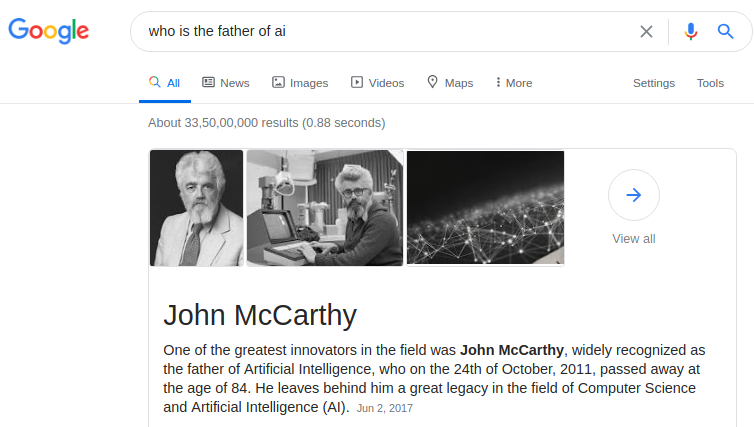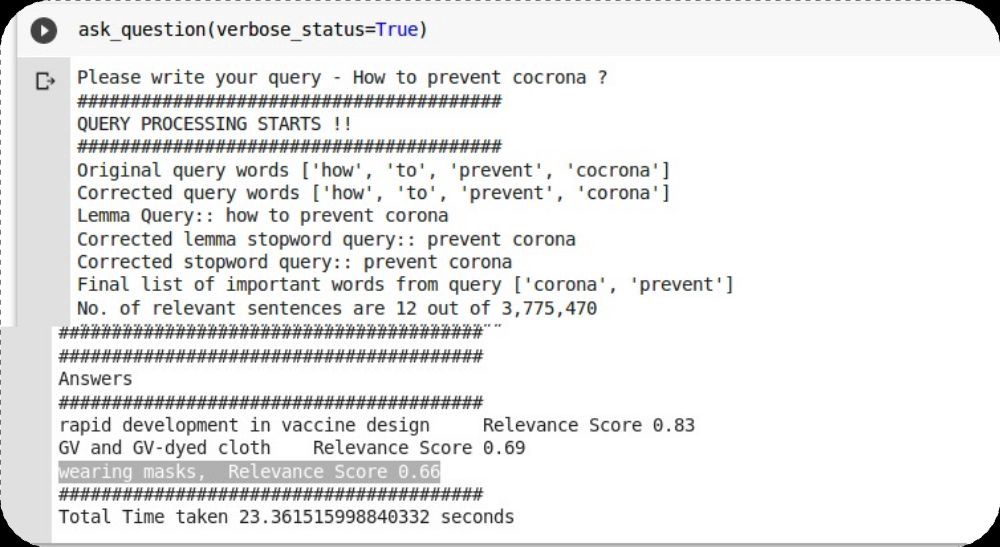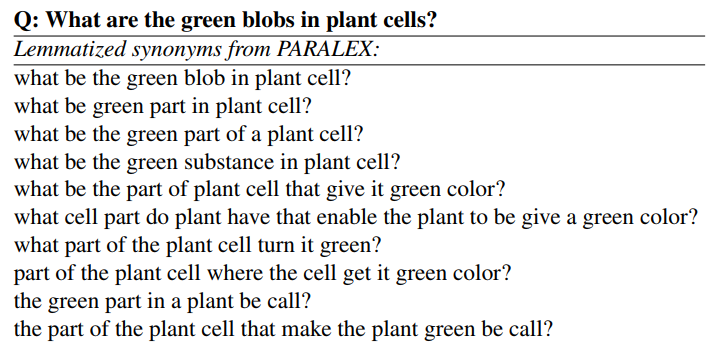Intelligent QA System With NLP for Optimizing Customer Interactions
Sanam Malhotra | 5th June 2020

The once thought fantastical ability for machines to answer any and every human question is becoming possible with Artificial Intelligence (AI). The computer science field, called Question Answering (QA) is an arguably efficient technology enabling systems to fetch contextual answers for user queries using informative resources. We, at Oodles, as an experiential AI Development Company, presents a comprehensive introduction to the mechanism of QA systems with NLP (Natural Language Processing).
The Rationale Behind QA Systems
Under Natural Language Processing (NLP), Question Answering or QA is a discipline that enables users to retrieve answers from machines for questions posed in natural language. To curate a meaningful response, QA systems are programmed to-
1) Perform context-based reasoning
2) Identify and classify questions based on training data
3) Search databases or knowledge base, and
4) Construct a response from unstructured knowledge.
For this reason, QA systems with NLP are much harder to build and deploy as compared to chatbots.
Typically, chatbot development services employ third-party frameworks such as Amazon Lex or IBM Watson to build rule-based virtual assistants. QA systems, on the other hand, demand prodigious volumes of data and expertise to retrieve answers for dynamic user queries. For instance, chatbots are programmed to address domain-specific queries, such as weather chatbot, food ordering chatbot, insurance chatbot, et al.
Whereas, QA systems work with extensive databases, basically written information in the form of articles, paragraphs, or web to narrow down answers. A general QA system architecture is given below-

Instead of giving a list of possible answers, NLP enables QA systems to provide a crisp short answer to user queries with techniques such as-
a) POS Tagging
b) Tokenization
c) Named Entity Recognition
d) Semantic Parser, and
e) Similarity Distance
Google stands as a perfect example of how deep learning powers QA systems with NLP to provide precise answers to questions like-

Google’s open-source BERT model is an exclusive example of NLP-based QA systems at play.
Enterprise Advantages of Deploying QA Systems with NLP
For enterprises, Question Answering models can significantly enhance customer interactions while responding to dynamic user queries in different domains. Businesses can couple NLP and speech recognition techniques to build voice-controlled virtual assistants quite similar to Alexa and Google Home.
Trained on enterprise and customer data, QA systems with NLP can stand a step ahead of basic chatbots to improve customer experience with the following features-
a) Customer service
Engaging potential customers and identifying new leads by analyzing customer requirements.
b) Awareness generation
In the face of the COVID-19 outbreak, NLP-QA systems can be put to address healthcare-related FAQs, push notifications, news stories, and more.

An article over medium by Aakash Goel demonstrates how the BERT model combined with datasets can be used to build a Coronavirus-specific QA system.
c) Administration and marketing
NLP algorithms can be trained to search and contextual information from large business datasets. In addition, the QA system can also assist business analysts to monitor the brand’s market position by analyzing social media interactions.
Also read- Conversational AI Trends 2020: Roadmap and Strategy
Types of QA Systems with NLP
On a surface level, QA systems encompass open and close domain types. Under open domain, systems can answer any type of user query with support of web-based knowledge. While closed domain systems limit the queries to specific questions such as insurance-related queries.
On a deeper level, there are two major techniques under question answering, namely-
1) Information Retrieval-based Factoid QA
The objective of IR-based factoid is to answer user queries by searching for short textual information over the web or given a database. Developing such a system involves question processing, query formulation and classification, passage retrieval, answer extraction, and applying BERT algorithms to land on the final answer.

Examples of IR-based factoid QA system by Stanford University.
2) Knowledge-based QA
This approach envelopes the idea of addressing questions in natural language by mapping them to a similar query in a structured dataset. The paradigm employs rule-based, supervised, and semi-supervised methods to tag similar questions with the same answer to streamline answering and logic.

The site WikiAnswers consists of millions of examples of knowledge-based question answering.
Notable Open-source Datasets to Build QA Systems with NLP
1) SQuAD
Stanford Question Answering Dataset (SQuAD) is an open-source reading comprehension dataset that envelopes over 100,000 questions posed by crowd-workers on a set of Wikipedia articles. Each of these questions is answered in the form of a segment of text from the corresponding reading passage.
2) Natural Questions
The Natural Question or NQ dataset is a corpus for training and evaluating NLP-QA systems facilitated by Google. Containing over 300,000 naturally occurring questions, the dataset is the first to replicate the end-to-end process wherein people can find answers to questions. The dataset enables researchers to build QA systems capable of addressing comprehension questions with over 120k Q&A pairs.
3) Question Answering in Context
Question Answering in Context (QA) is another rich QA dataset that encompasses modeling, understanding, and participating in information seeking a dialog. For instance, a conversation between a student and a teacher, wherein a student poses questions to learn about hidden Wikipedia texts. QuAC’s developers claim that the dataset “introduces challenges not found in existing machine comprehension datasets”.
Oodles AI: Your Partner to Build Intelligent QA Systems With NLP
In the wake of dynamic customer demands, it has become essential for businesses to adopt emerging technologies to address and serve customers better. We, at Oodles AI, enables enterprises to harness the power of AI, machine learning, and deep learning to build sophisticated solutions.
Our seasoned team of AI developers has hands-on experience in developing domain-specific chatbots, virtual assistants, and question answering systems such as-
a) Healthcare awareness chatbots
b) Insurance chatbots
c) eCommerce chatbots and more.
Connect with our AI team to explore more about our AI and NLP capabilities.



